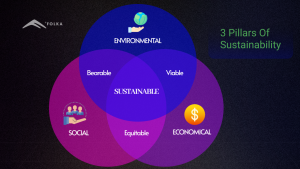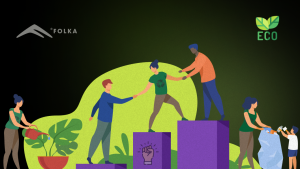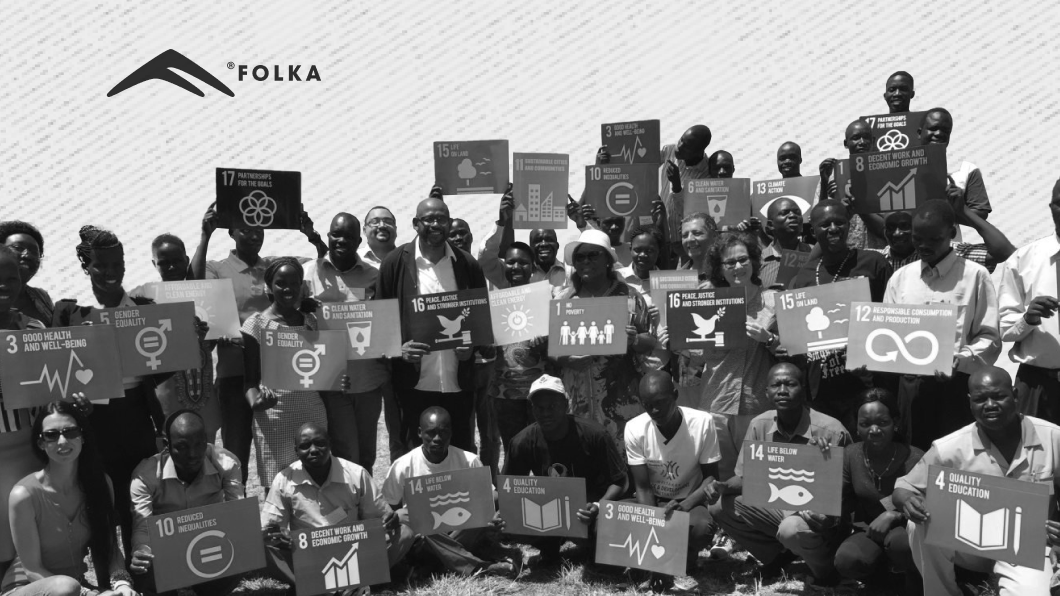What is sustainability?
Sustainability refers to the ability to meet the needs of the present without compromising the ability of future generations to meet their own needs. It involves considering the long-term impacts of our actions on the environment, society, and economy, and taking steps to preserve natural resources and protect the planet for future generations.
Sustainability encompasses a wide range of issues, including environmental protection, social justice, and economic development. It involves finding ways to meet our needs in a way that is both efficient and equitable, and that minimizes the negative impacts of human activity on the environment.

The pillars of sustainability, also known as the three pillars of sustainability or the triple bottom line, refer to the three interconnected dimensions of sustainable development: environmental, social, and economical.
1.Environmental sustainability: This pillar refers to the need to protect and preserve the natural environment for future generations. It involves taking actions to reduce waste and pollution, conserve natural resources, and protect biodiversity.
2. Social sustainability: This pillar refers to the need to create a just and equitable society that meets the needs of all people. It involves addressing issues such as poverty, inequality, and social exclusion.
3. Economic sustainability: This pillar refers to the need to create a strong and stable economy that provides opportunities for growth and prosperity. It involves promoting economic development and innovation while also taking into account the long-term impacts of economic activities on the environment and society.
By considering the environmental, social, and economic dimensions of sustainability, we can create a more balanced and sustainable future for all.
What is sustainable living?
Living sustainably means making choices that minimize the use of resources, such as energy and water, and reduce waste and pollution. It’s a way of living that recognizes the impact our daily actions have on the environment and works to preserve natural resources for future generations. It means understanding how our lifestyle choices impact the world around us and finding ways for everyone to live better and lighter. Sustainable living and lifestyles for the first time appear in the Sustainable Development Goals (4 Education and 12.8 Responsible Consumption).

Here are a few steps you can take to start living sustainably:
Reduce energy consumption: Turn off lights and appliances when they are not in use, use energy-efficient light bulbs, and consider switching to renewable energy sources like solar or wind power.
1.Conserve water: Fix any leaks in your home, use a low-flow toilet and showerhead, and water your plants during the early morning or late afternoon when evaporation is lower.
2.Reduce waste: Recycle as much as possible, compost food scraps and yard waste, and consider purchasing products made from recycled materials.
3.Use sustainable transportation: Walk, bike, or use public transportation whenever possible. If you must drive, consider carpooling or purchasing a fuel-efficient vehicle.
4.Support sustainable agriculture: Purchase locally grown, organic produce and products made from sustainable materials.
5.Conserve resources: Purchase products made from sustainable materials, such as bamboo or organic cotton, and consider the full life cycle of a product before making a purchase.
6.Use reusable bags, containers, and water bottles: Single-use plastics can take hundreds of years to decompose and contribute significantly to pollution. By using reusable bags, containers, and water bottles, you can reduce the amount of waste you generate.
7.Support sustainable businesses: Look for businesses that prioritize sustainability in their operations, such as using renewable energy sources, reducing waste, and supporting environmentally friendly practices.
8.Buy secondhand: Instead of buying new items, consider purchasing gently used or vintage items from thrift stores, consignment shops, or online marketplaces. This can help to reduce the demand for new products and the resources needed to produce them.
9.Educate yourself and others: Learn about sustainability and share your knowledge with others. Encourage your friends, family, and community to adopt sustainable practices and advocate for policies that support a more sustainable future.
By making these small changes in your daily life, you can help to reduce your impact on the environment and contribute to a more sustainable future.
What is the importance of sustainable living
Sustainable living is important for a number of reasons. Here are a few:
1.Preserving natural resources: By using resources efficiently and reducing waste, we can help to conserve natural resources such as water, forests, and fossil fuels.
2.Reducing pollution: Many of the products and activities that contribute to our modern way of life also generate waste and pollution, which can have negative impacts on the environment and our health. By living sustainably, we can reduce our contribution to pollution and protect the air, water, and soil that we all rely on.
3.Supporting economic growth: Sustainability can also have economic benefits. By using resources efficiently, we can reduce costs and increase productivity, and by supporting sustainable businesses, we can stimulate local economic growth.
4.Protecting the environment for future generations: Our actions today will have an impact on the world that our children and grandchildren inherit. By living sustainably, we can help to preserve the planet for future generations and ensure that they have the resources they need to thrive.
Overall, living sustainably is important because it helps to ensure that we can meet the needs of the present without compromising the ability of future generations to meet their own needs.
Benefits of sustainable living
There are many benefits to living sustainably, both for individuals and for society as a whole. Here are a few:
1.Economic benefits: By using resources efficiently, we can reduce costs and increase productivity. Supporting sustainable businesses can also stimulate local economic growth.
2.Environmental benefits: Sustainable living helps to reduce waste and pollution, conserve natural resources, and protect the air, water, and soil that we all rely on.
3.Health benefits: Many of the practices associated with sustainable living, such as eating a plant-based diet and using public transportation, can have positive impacts on our health.
4.Social benefits: Sustainable living can also promote social cohesion and community involvement, as it often involves working together and collaborating with others to achieve common goals.
Our future now depends on our behavior and how we choose to live, work and play as global consumers – how we run our homes, what food we eat, how we get around, how we relax, what we buy, and how we care for our planet.
FOLKA is trying its best to give awareness to people and work on Nature-based solutions to reach our vision of “creating a sustainable and equitable world”.
Overall, the benefits of sustainable living are numerous and far-reaching, so that sustainable living, in line with the Sustainable Development Goals, becomes the norm (the New Normal) for people everywhere. By adopting sustainable practices, we can help to create a healthier, more prosperous, and more equitable world for all




